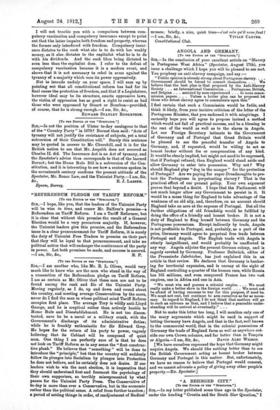ANGOLA AND GERMANY.
[To THE EDITOR OF THE "SPECTATOR."]
Sia,—In the conclusion of your excellent article on "Slavery in Portuguese West Africa" (Spectator, August 17th), you issue a challenge which I hope you will be pleased to see met.
You prophesy an anti-slavery campaign, and say :—
" Public opinion is already strong about Portuguese slavery. . . . Government should be forced to commit themselves. . . . We believe that the best plan is that proposed by the Anti-Slavery Society . . . an International Commission . . . Portuguese, British. and Belgian . . . assisted by men experienced . . . to issue manu- mission papers. . . . Unless a better plan can be proposed lot those who detest slavery agree to concentrate upon this."
I feel certain that such a Commission would be futile, and think it likely, from your incisive criticism of the letter of the Portuguese Minister, that you endorsed it with misgivings. I earnestly hope you will agree to propose instead a method which would not fail of practical success, and be a blessing to the rest of the world as well as to the slaves in Angola.
Let our Foreign Secretary intimate to the Government of Germany and of Portugal that Great Britain would be pleased to see the peaceful transfer of Angola to Germany, and, if requested, would be willing to act as honest broker without fee or compensation of any kind. It would be clearly implied, but might not need to be expresaed, that if Portugal refused, then England would stand aside and allow Germany to enter into possession. Why not ? Why should England play " dog in the manger " for the protection of Portugal ? Are we paying for super-Dreadnoughts to pro- tect the Portuguese in perpetuating slavery ? That is the practical effect of our present policy. Your own argument proves that beyond a doubt. I hope that the Parliament will not much longer allow any Government to persist in it. It would be a mean thing for England to take advantage of the weakness of an old ally, and, therefore, on no account should England take an acre at the expense of Portugal. But all the further obligations of old friendship would be fulfilled by doing the office of a friendly and honest broker. It is not a duty of England to fling herself between Germany and the Portuguese possessions. Except indirectly by trade, Angola is not profitable to Portugal, and, probably, as a part of the price, Germany would agree to perpetual free trade between Portugal and Angola. The English trade with Angola is utterly insignificant, and would probably be unaffected in any way. Angola adjoins the present German colony, and is eagerly coveted by Germany. Professor Delbriick, editor of the Preussische Tahrbiicher, has just explained this in an article in that review. He declares that Germany is hanker- ing for territorial expansion, and is uneasy at the sight of England controlling a quarter of the human race, while Russia has 165 millions, and even conquered France has two vast empires, one in Africa and one in Asia.
" We must win and possess a colonial empire.. . . We must really make a better show in the foreign world. . . . We must not be afraid of having recourse to war for this purpose, if need be. We must not rest, but continue to arm ourselves as far as neces- sary. In regard to England, I do not think that matters will go to such an extreme as that, and I believe that a peaceable under- standing will be arrived at eventually." . . .
Not to make this letter too long, I will mention only one of
the many arguments which might be used in support of letting Germany have Angola, and that is the fact, well known to the commercial world, that in the colonial possessions of
Germany the trade of England fares as well as anywhere out- side our own Crown colonies, and far better than in Tonquin
[We have ourselves expressed the hope that Germany might acquire Angola. We should like nothing better than to see the British Government acting as honest broker between Germany and Portugal in this matter. But, unfortunately,
we have no reason to believe that Portugal would consent, and we cannot advocate a policy of giving away other people's property.—En. Spectator.]


































 Previous page
Previous page